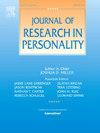Too proud to doubt? The relationship between narcissism and intellectual humility
IF 3.1
2区 心理学
Q2 PSYCHOLOGY, SOCIAL
引用次数: 0
Abstract
While narcissism and intellectual humility may seem incompatible, their relationship is more complex due to their multidimensional nature. Across two studies (N1 = 219, Mage = 23.47; SDage = 8.37; N2 = 278, Mage = 21.96; SDage = 4.12; participants recruited through social networking websites), we examined links between three narcissism facets (agentic, antagonistic, neurotic) and four aspects of intellectual humility, controlling for personality and intelligence. Antagonistic and neurotic narcissism were strongly negatively related to independence of intellect and ego, suggesting difficulty separating disagreement from personal threat. Antagonistic narcissism also predicted lower respect for others’ views. In contrast, agentic narcissism showed modest positive links to openness and respect for differing opinions. All three narcissism types were negatively associated with a lack of intellectual overconfidence, highlighting inflated belief in one’s superiority as central to narcissism.
骄傲到不敢怀疑?自恋和智力谦逊之间的关系
虽然自恋和智力谦逊似乎不相容,但由于它们的多维性,它们的关系更加复杂。在两项研究中(N1 = 219, Mage = 23.47; SDage = 8.37; N2 = 278, Mage = 21.96; SDage = 4.12;参与者通过社交网站招募),我们研究了自恋的三个方面(代理型、对抗性、神经质)和智力谦逊的四个方面(控制个性和智力)之间的联系。对抗性和神经性自恋与智力和自我的独立性呈强烈负相关,表明难以将分歧与个人威胁区分开来。对抗性自恋也预示着对他人观点的不尊重。相比之下,代理自恋与开放性和对不同意见的尊重表现出适度的正相关。所有这三种自恋类型都与缺乏智力上的过度自信负相关,突出了对自我优越感的夸大信仰是自恋的核心。
本文章由计算机程序翻译,如有差异,请以英文原文为准。
求助全文
约1分钟内获得全文
求助全文
来源期刊

Journal of Research in Personality
PSYCHOLOGY, SOCIAL-
CiteScore
5.40
自引率
6.10%
发文量
102
审稿时长
67 days
期刊介绍:
Emphasizing experimental and descriptive research, the Journal of Research in Personality presents articles that examine important issues in the field of personality and in related fields basic to the understanding of personality. The subject matter includes treatments of genetic, physiological, motivational, learning, perceptual, cognitive, and social processes of both normal and abnormal kinds in human and animal subjects. Features: • Papers that present integrated sets of studies that address significant theoretical issues relating to personality. • Theoretical papers and critical reviews of current experimental and methodological interest. • Single, well-designed studies of an innovative nature. • Brief reports, including replication or null result studies of previously reported findings, or a well-designed studies addressing questions of limited scope.
 求助内容:
求助内容: 应助结果提醒方式:
应助结果提醒方式:


